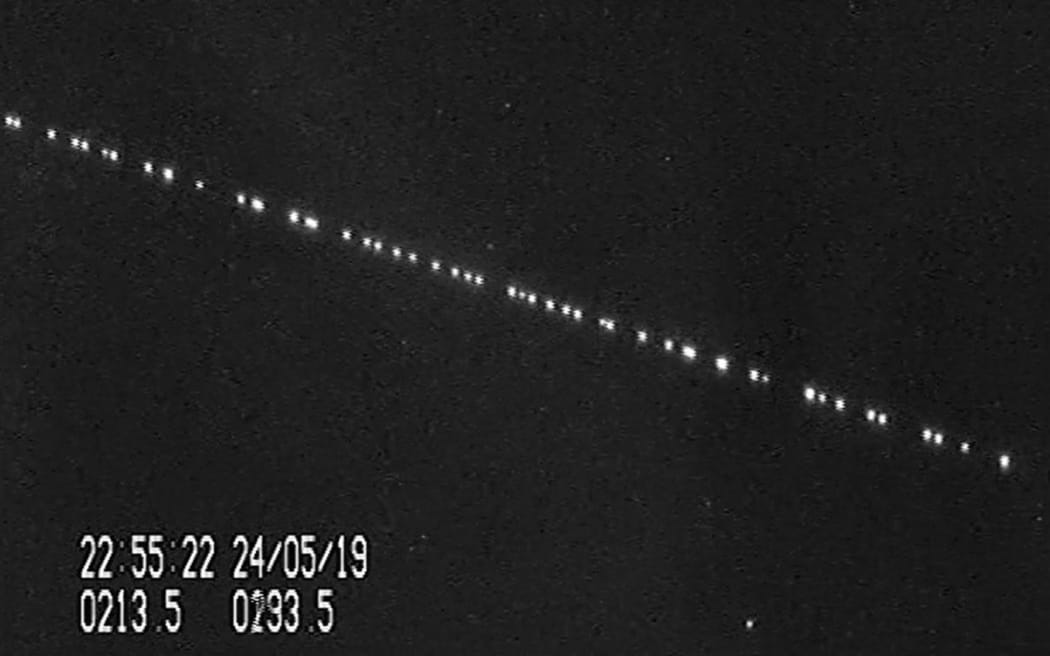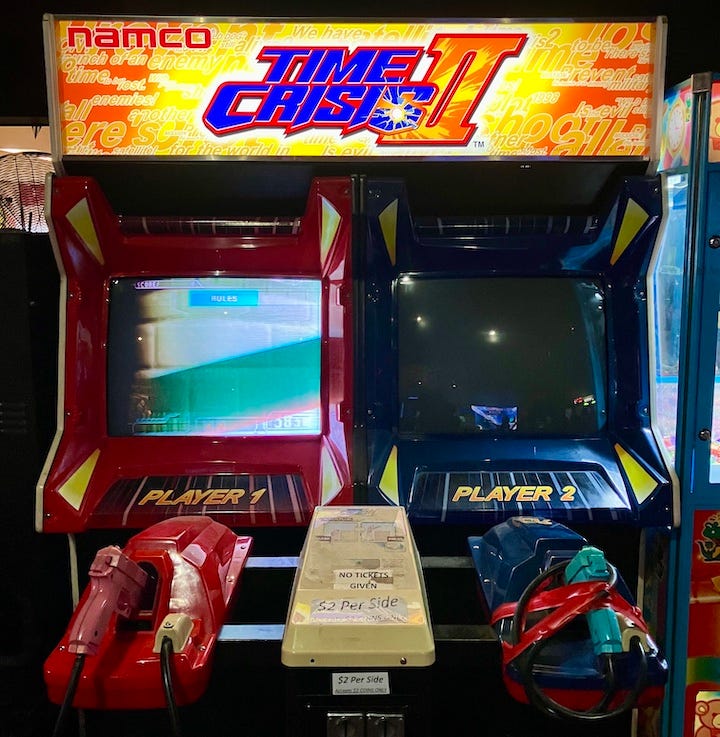Is New Zealand Better, or Just Behind?
What timeline are we in?
On a recent rainy weekend I took my kids and a friend to the bowling alley in Masterton, where I gave them too much pocket money for the arcade out back. As they pumped those heavy, gold NZDs into the claw machine I gawked at an ancient two-person shooter lurking in the corner. On the red player’s burnt-out screen the baddies scampered through a bright haze. The blue player’s screen was dark, the blue gun fiercely taped to its holster. The game was Time Crisis II. The copyright date on the cabinet was 1997.
Time crisis, indeed.
What the hell was this artifact of the past doing in my New Zealand present?
What shiny American future was I forsaking by raising my kids here?
Does America even have a shiny future anymore?
Is my new country stuck in the same cursed timeline as the old?
Easy answers first. Masterton ain’t rich. New Zealand is a long way from the metropoles where shiny new things are made. Shipping costs are insane. Hard to imagine either the bowling alley or its customers springing for the replacement.1
The timeline question is weirder.
Yanks in New Zealand like to say this country feels like it’s still living in the 1990s, or the ’80s or, god help us, even the ’50s. There are clear problems with this take—hang on, I’ll get there—but the feeling is real. To an American, New Zealand is the cabin town of the Western world, a pretty village tucked away in the global Catskills where us city cats flee to cosplay simpler times. In Kiwi English: To Americans, New Zealand is our bach.
We say this with affection, I promise! We love barefoot kids climbing trees at school. Smalltalk straight out of Mayberry. Cafes with more gossip than laptops. Less phones out, less terror of lawsuits, less guns. Butcher shops! Less crap to buy. Stores close early. Homemade flyers for the rugby. A few ignored Starbucks. No Amazon.
We say it in frustration, too. Lordy, the dim small-c conservativism of prize roses and a white picket fence. The blokey emotional repression. A stone-age indifference to school bullying. Cramped and shoddy public buildings. A Kiwi mate of mine rolls his eyes at the very ’90s chicken-and-cranberry sandwiches still haunting cafe cabinets.
We’re not entirely making this up. There are timestamps. Humans crossed the landbridge to the Americas millenia before they sailed to Aotearoa. Our European settlers arrived centuries earlier, too, and we’ve already kicked out the British. The Sixties didn’t really hit NZ until the ‘81 Springbok tour. I still see Wellington office bros in skinny jeans.
But this story leaves out all the ways in which New Zealand has totally lapped us. First in the world for women’s suffrage (1893, to our 1920). Carterton just up the road here elected the world’s first transgender woman mayor in 1995. NZ’s early internet banking beat out third-party payment apps: Kiwis swap account numbers with total strangers while the Peter Thiels of the world never see a dime. The decolonization conversation here is miles ahead of ours, deep and rich and often thorny but filled with genuine future-seeking joy. A Māori scientist way younger than I am is building a fusion reactor outside Wellington, at a company he’s given the hopeful sounding name of OpenStar. The government’s already banned cell phones in schools.
The 2019 Christchurch mosque shootings—that one’s in lockstep with American time.
The 2022 siege of Wellington, NZ’s own Jan. 6—also right on schedule.

Last time I went to grad school I read Johannes Fabian’s Time and the Other, a very cool slab of theory that smashes what the German-born anthropologist saw as the central “conjuring trick” of his trade. The western observer, he noted, always claims to live in the present while placing the people they study in the past. The conception of time is an expression of power, and the mighty wield it like money or law or language or guns. American colonists did it to the Native Americans. New Zealand colonists did it to the Māori. You bend time to separate yourself from the other.
And that’s the classic American expat move—with a twist. We cast New Zealanders in an idyllic past, then try to crawl right in after ‘em.2
It’s a lie, is the point. Even the envious expat version. We are all of us in the present, all of the time, everywhere.
Fabian published his book in 1982. I think it hit harder before the internet.
On the internet we’re all stuck in the crowded, angry mall of the now.
The mall’s a pretty American place, too. The Christchurch massacre was livestreamed on Facebook. The siege of Parliament in Wellington was supercharged by a well-documented surge in online misinformation into a country that had largely gone under the radar. One researcher called it a flood of “US-style content.”
So both countries share this uneasy present. Where do we go from here?
Time Crisis II has nine levels. It’s Dante’s Inferno as a light-gun shooter game. An evil billionaire has launched a vast network of satellites. Now he’s loading one with a nuclear weapon, with plans to sell it to the highest bidder. You’re a secret agent with a 9mm semiautomatic who must perform nine mass shooting events in order to stop him. The billionaire’s satellite network is named Starline.
Elon Musk’s Starlink internet service debuted in New Zealand in 2021. I first saw his satellites one night that summer while camping on the banks of the Whanganui River. Thirty, forty, fifty of ‘em, soldiers following one man’s orders in a dead-straight line across the heavens.
I had a sense we’d escaped something by coming to New Zealand. That night I knew escape was a game you play over and over. The satellites left silently as they had come, rolling away over the Pacific. One future had ended, and another began. //

On time machines and the internet:
The bowling alley does have a VR-headset game proudly installed by the front door. I don’t remember the cost per game—$5 NZD?—but it was enough that none of the kids chose to spend their precious coins there.
Americans do versions of the Fabian twist to charming places the world over. Think of the celebrtion of the (allegedly) slower, more traditional life of the Mediterranean countries. The lifestyle may in fact be superior, and there’s nothing wrong with seeking a change! It’s the framing of the difference Fabian finds icky. See also its inverse in big Asian cities, which we relegate to the Blade Runner future. Of course I never did this in Shanghai.






Yes but...so many buts.
NZ has always been behind - but then the European part of culture started late and even when you hold up a light to our 'firsts' you need to be careful to not make that light too bright. Just look at the reasons women got the vote here - essentially it was an exchange of promises between Women's Temperance groups and Parliament - and the vote didn't include Chinese women and a few other groups - there were no martyrs.
There are many things to add to this particular stew - alas, I have to take the dog out to a fabulous park where, as a women, alone in hectares of suburban parkland on a weekday morning wiht only a ridiculously cute small dog and a walking stick, I will stupidly feel safe even though I know there's only history to suggest this assumption as true today as it was yesterday.
Oh and PS Yes Masterton is not a wealthy area but there are a few billionaires, and close to billionaires, living there.
Really interesting, Dan, & sad. The first time I saw those satellites I had an overpowering urge to smash them out of the sky with a rock. During Covid a lot of Americans arrived in Wellington (those who could afford to flee, mostly). I noticed they seemed to have this see-sawing love / hate, on the one hand, isn't everything so quaint & delightful, on the other hand, things are better & bigger in America. I found this annoying, because you can't have both, you know what I mean? That's there & this is here.
I can remember one conversation with a newish American where he asked me, was I good at what I do (making art)? I looked him dead in the eye & said I was good, yeah, & he fell on me like a starving animal, thank God! he said, someone who was actually willing to admit to skill & prowess! He was so sick of having to pretend to be humble!
By the way rose shows are awesome, skinny jeans are also acceptable in my books, but as you say I am something of a backwards savage LOL. Take all this with a grain of salt, I like that you are digging into these emotional contradictions.